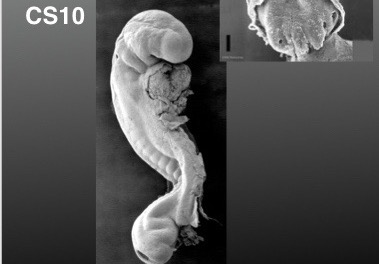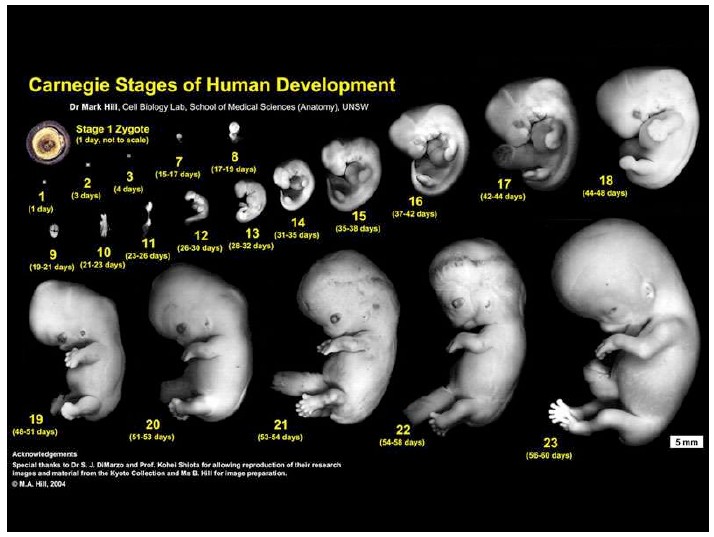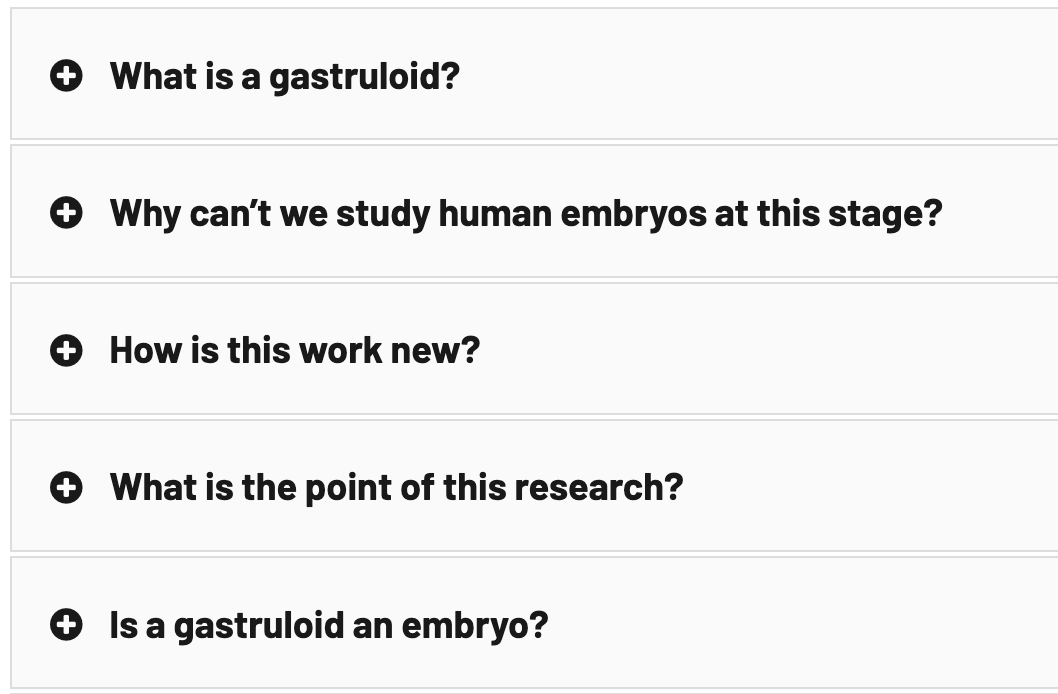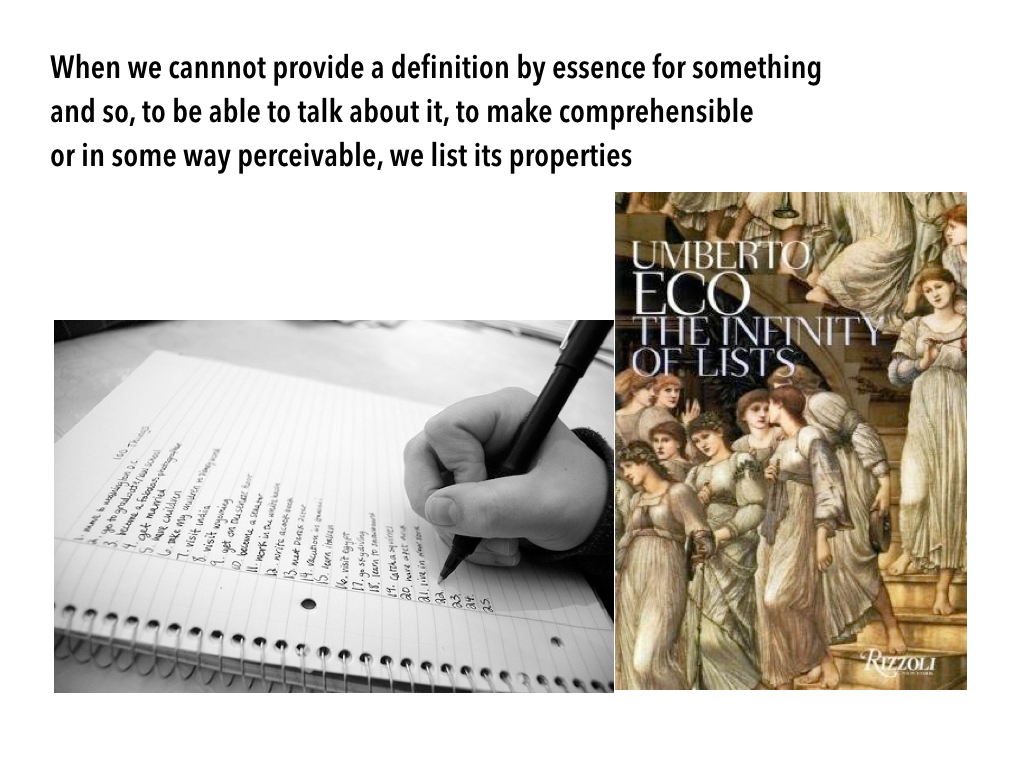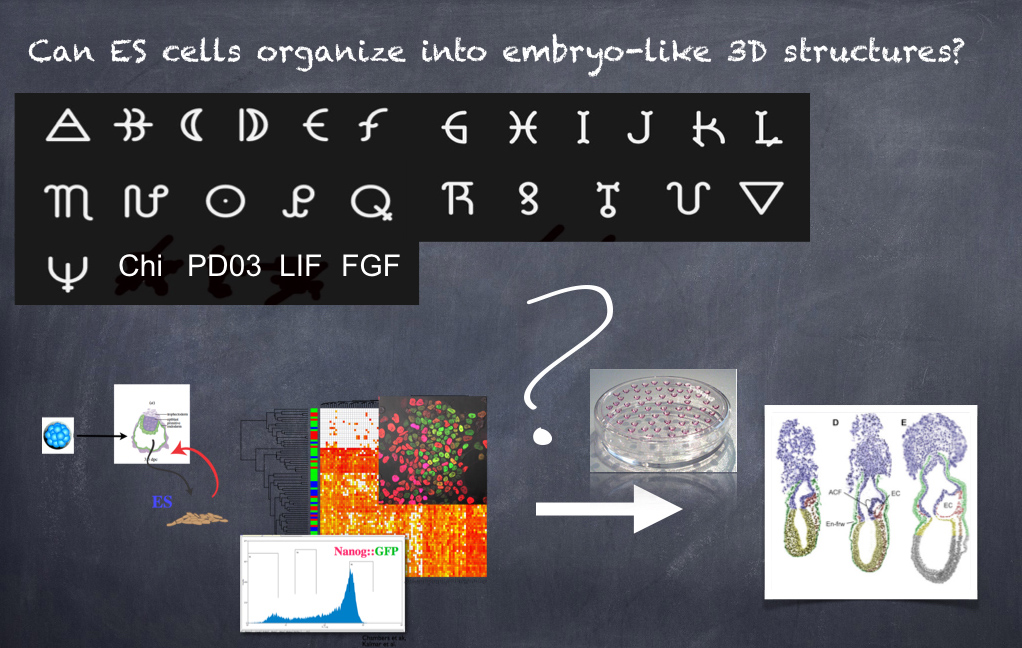III. Models of human development Pluripotent stem cells (PSCs: ESCs and iPSCs) create opportunities to address the ethical and technical constraints associated with the use of human embryos. In order to discuss and evaluate these opportunities it is important first to provide a context for this work and look at its roots and assess its limitations. These days one has the impression that Embryonic Stem Cells (ESCs) are collections of genes, of epigenetic modifications all revealed by barcodes and sophisticated genomic technologies but, actually they are cells and their surname is embryonic, and cells are the units of the embryo, […]
Continue readingCategory: Blog Posts
Notes on Human Embryos
II. The 14-day rule and its implications The 14-day rule is an important landmark in the study of the development of human embryos. Established as part of the conclusions of the Warnock committee of Inquiry into Human Fertilisation and Embryology (1), later enshrined into British law by an act of Parliament in 1990, it demarcates a line that cannot be crossed when growing human embryos ex vivo and has served as the reference for work with human embryos since. At the time, 1984, the ability to culture fertilized human eggs ex vivo did not go beyond three or four days, […]
Continue readingNotes on Human Embryos
I. What we know and what it can tell us about ourselves Embryos are, or should be, familiar entities to people reading this blog, most likely biologists or scientists with an interest in Biology; but don’t take this knowledge for granted. Ask around what is an embryo and you will find difficulty in expressing an answer: a baby, a foetus, something small inside the womb of a pregnant woman, something to do with In Vitro Fertilization (IVF) are some answers I encountered when doing the exercise. “Embryo” is a word behind an entity which remains a big unknown. In the […]
Continue readingHuman Gastruloid FAQs
What is a gastruloid?
A gastruloid is a three-dimensional structure made up of Embryonic Stem Cells (ESCs), that models certain features of early embryo development. In particular, gastruloids transition from an initial rounded to an elongated shape (a transformation similar to the early shape changes of the developing embryo), and generate cells associated with the three primary cell layers of early embryos (the germ layers) that are necessary for development of the different tissues and organs. Over time, these cells become organized with reference to a coordinate system, much as they do in the embryo. Gastruloids do not contain any brain cells or the cells necessary for the embryo to interact with the maternal environment.
The Finite Present of Future Plans
Image: Madrid after lockdown (Reuters) “The infinite present of no future plans” is a phrase by American journalist Helen Rosner that has been doing the rounds on Twitter. This probably make sense if we think that the virus has acted as an eraser on a slate. Cities, jobs, lives have been, indeed, wiped clean and sometimes it feels as if the future will never come. However, as countries think of opening up, the present is finite and we can make plans. Covid time is a long haul with many twists and turns, a crossing that has to be negotiated steadily […]
Continue readingScience in Covid Time
Don’t forget where we were This blog is back. I cannot remember a time when Science had been so much and for so long in the news. It makes the headlines daily, journalists scramble to get the views of scientists, governments look for the opinions and advice of scientists and this at an international level. The media explains how scientists work and the world discovers that we are no different from other people, that we argue and doubt, that Science is not (only) about truth but more, as has been said, about managing uncertainty. How much can a little creature […]
Continue readingNumbers, data, lists: the end of Biology or the dawn of a new era?
These are notes were the reference from a lecture given at the Danby Society of Downing College on 14 February 2018 under the title ‘Any questions? The challenges of Science in a data driven world’ The era of the History of Science ushered by the publication of Newton’s Principia Mathematica is coming to an end; we need to take stock of this and consider the possibilities that a new, data centered and driven reality offers to us. The inflexion point that Newton represents does not mean that there was no Science before then; there was a lot that we would recognize […]
Continue readingIn defence of Embryonic Stem Cells as a new model system for Developmental Biology
Over the last year a trend has emerged, highlighted by several articles, to defend model systems, specifically in Developmental Biology. The reason for this is a perceived (and real) threat in the funding of research in yeast, C. elegans, Drosophila, sea urchins and other systems e.g ascidians or arabidopsis (the issue of the animalcentric view of developmental biology is an interesting one) despite their research potential supported by many and obvious substantial contributions to our understanding of biological systems. One of the latest in this series of statement was published recently (1: https://dmm.biologists.org/content/10/12/1381). The authors do an excellent exposition of […]
Continue readingDevelopmental Biology: the cauldron of the biological sciences
Disclaimer: I am not a historian of Science and these views are, simply, sketches from the fringes of my interest in the subject as a practitioner of Developmental Biology. Sometimes it is possible to draw some sort of a straight line in the history of Science. For example, one can build a sensible narrative across an axis Galileo-Copernicus-Kepler-Newton….or, sort of, as most of the time a scientific discipline is a pidgin of varying questions, thought traditions, data and, importantly, visions of different scientists and surprising experimental results. Any attempts to trace a scientific discipline to a specific root will be […]
Continue readingThinking About Science in Trump’s USA: A Warning from History
The old Chinese curse, “may you live in interesting times”, has been thrust upon us; interesting times, indeed. Well, more than interesting, surreal. Brexit and Trump are just what is closest to us but let us not forget the puzzling situation in Syria and the mystery that Russia always is (the famous adage of Churchill about the Soviet Union always comes to mind: “a riddle wrapped in a mystery inside an enigma”). One of the most surprising features of these times is the disregard for logic and sense, the creeping influence of “the falsehood” and a plump disregard for objective, […]
Continue reading


